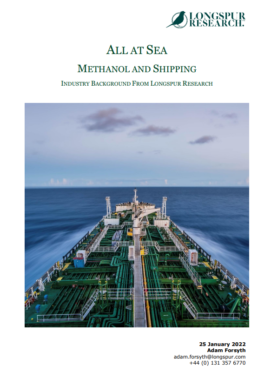Investor Research Shows Methanol is the Best Solution to Solve Shipping’s Emissions Problem
Longspur Research have today published a report addressing the most urgent question for the maritime industry and its investors: the reduction of emissions from the global maritime sector, which are responsible for up to 3% of global greenhouse gas emissions.
The report looks at the potential solutions for decarbonisation in a market worth US$105 billion per annum and verifies many of methanol’s benefits – its fungibility, availability, energy density and ability to significantly reduce emissions today.
 The full report has been published to investors globally and is available for download here.
The full report has been published to investors globally and is available for download here.
Shipping generates over 1 billion tons of emissions, roughly equivalent to the total emissions of Germany. As well as carbon dioxide (CO2), shipping emissions include airborne pollutants such as sulphur oxides (SOx), nitrous oxides (NOx) and particulate matter, all of which have a significant proven impact on air quality and public health.
Regulations from the International Maritime Organisation (IMO) and European Union (EU), as well as increased requirements from customers and financial institutions, will push the shipping industry towards net zero emissions by 2050 at the latest. For shipowners, 2050 is only one vessel lifetime away.
Various factors will drive fuel choice: energy density, emissions, ease of handling and cost. Taking all of these factors into account, this report verifies that methanol is the best solution available today. It can take an immediate role as it is already commercially and technically viable. The safety of methanol was confirmed in November 2020 with the IMO’s approval of guidelines for methanol to be used as a safe ship fuel.
Unlike the majority of other alternative marine fuels, methanol reduces emissions in the short, medium, and long term. Investment in sustainable methanol production is increasing year-on-year, meaning that shipowners switching to methanol now will benefit from a clear decarbonisation pathway as increasing quantities of low-carbon blue and sustainable green methanol are blended with conventional grey methanol.
With its clean-burning qualities, ship owners switching to methanol fuel can immediately eliminate SOx and particulate matter and cut NOx emissions by over 60%. Methanol produced from natural gas offers an initial 10-15% CO2 saving, rising to over 90% when using renewable methanol.
Some of the world’s largest shipping companies have recently backed methanol as the leading alternative marine fuel for the future. In January 2022, Maersk increased their order from eight to twelve large container ships to run on e-methanol, with delivery expected in 2023 and 2024. Significant investments have also been made by leading engine manufacturers MAN and Wartsila in methanol fleets and technology.
